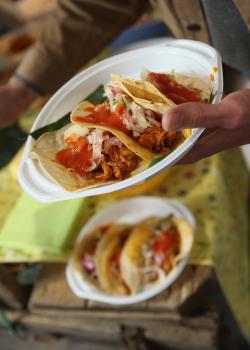Texans and Mexican food enthusiasts—or perhaps that should be “Texans and other Mexican food enthusiasts,” since I’ve found the former group to be a subset of the latter—will be interested in Texas Monthly’s oral history of the breakfast taco, appearing under the charming headline “The Most Important Taco of the Day.” The authors of the new book Austin Breakfast Tacos interviewed members of the family that runs the chain The Tamale House—one of the first restaurants to popularize breakfast tacos in Texas’ capital in the 1980s.
Breakfast tacos are a peculiar culinary phenomenon. Despite being pretty much universally popular in Central Texas, and despite comprising accessible American ingredients like bacon and eggs (and despite being delicious), they still haven’t found much of a following beyond Texas’ borders. In fact, as Tamale House scions Diana Valera and Robert Vasquez explain, they didn’t find a following within Texas’ borders until fairly recently. Valera recalls the de facto segregation of Mexican families that limited Mexican restaurants to East Austin in the early to mid-20th century, and Vasquez recalls how Mexican food was stigmatized when he was growing up in the 1940s:
You wanna know what it was like as a kid eating tacos? If I took tacos to school, everyone would say shame on you. There was a lot of shame eating a taco back then. You had to hide them. You couldn’t eat them in front of nobody. And this was among a school that was 80 to 90 percent Anglo and very few Mexicans. So I had to hide my food. But now, 80 to 90 percent of Anglos eat tacos! I would say 80 to 90 percent of my customers are Anglo. And they eat tacos like they’ve never had anything before in their life! So things have changed. I think to myself, I remember a time when I would get made fun of. And now everybody’s eating tacos. It’s not just Mexicans anymore.
The entire thing is worth reading, as a reminder that Mexican food has not always been the culinary darling it is now. Today, with white chefs operating wildly successful taco chains and Mexican-fusion restaurants getting two-star reviews in the New York Times, it’s practically a given that middle-class white people like making and eating Mexican food. Valera’s and Vasquez’s memories are proof that the mainstreaming of Mexican cuisine happened because Mexican immigrants worked hard in the face of racism, not in the absence of racism. As Gustavo Arellano showed in last year’s Taco USA, the history of Mexican food in America isn’t as simple as many people might prefer to think—tacos have faced plenty of xenophobia and cultural appropriation on their way to the top.
In addition to the history lesson, “The Most Important Taco of the Day” features a stellar-looking recipe for potato, egg, bacon, and cheese tacos and enough enticing descriptions of breakfast tacos to make you wonder why, in the oral-history boom of the early 2010s, oral historians haven’t focused more of their attention on food.
